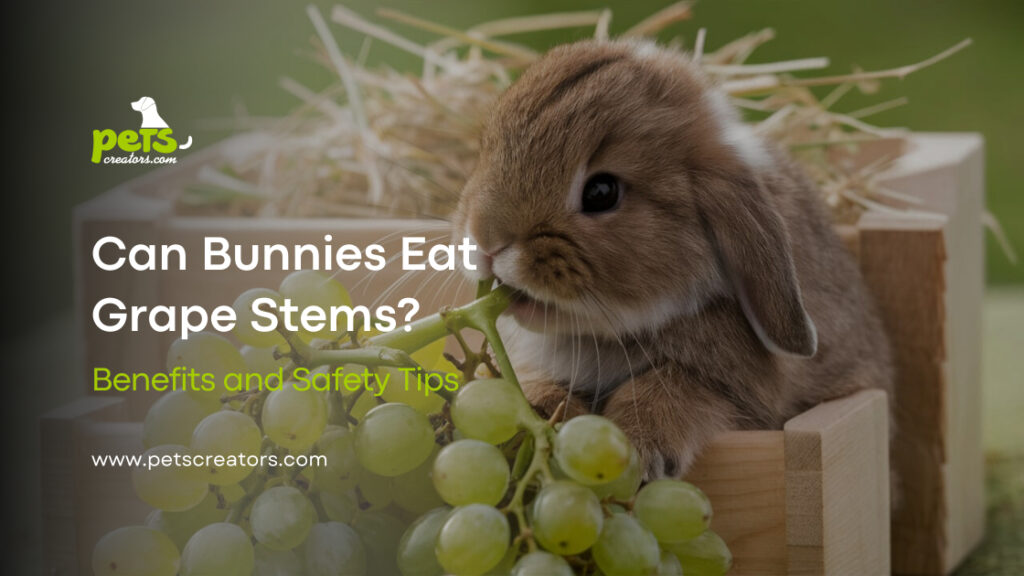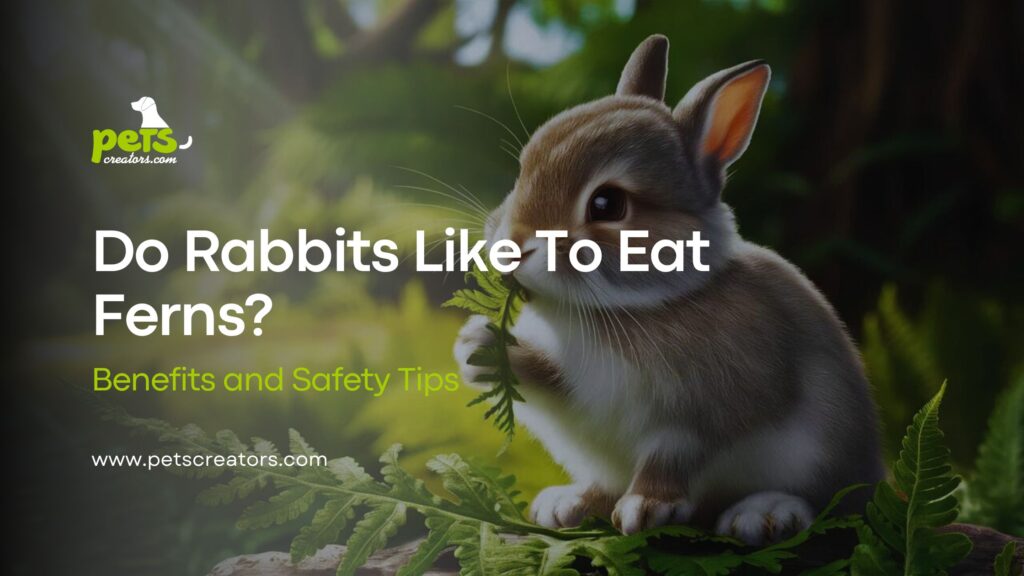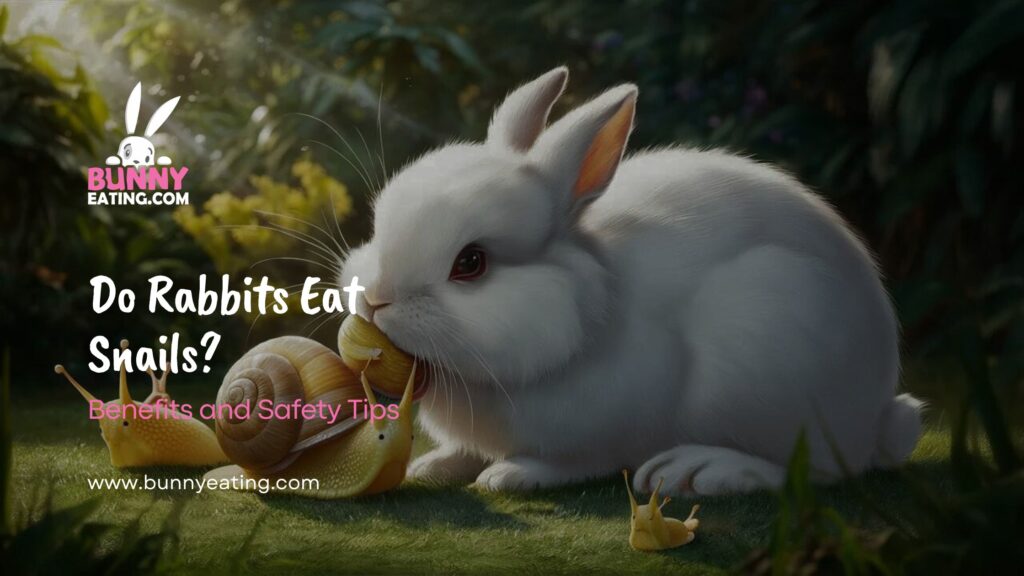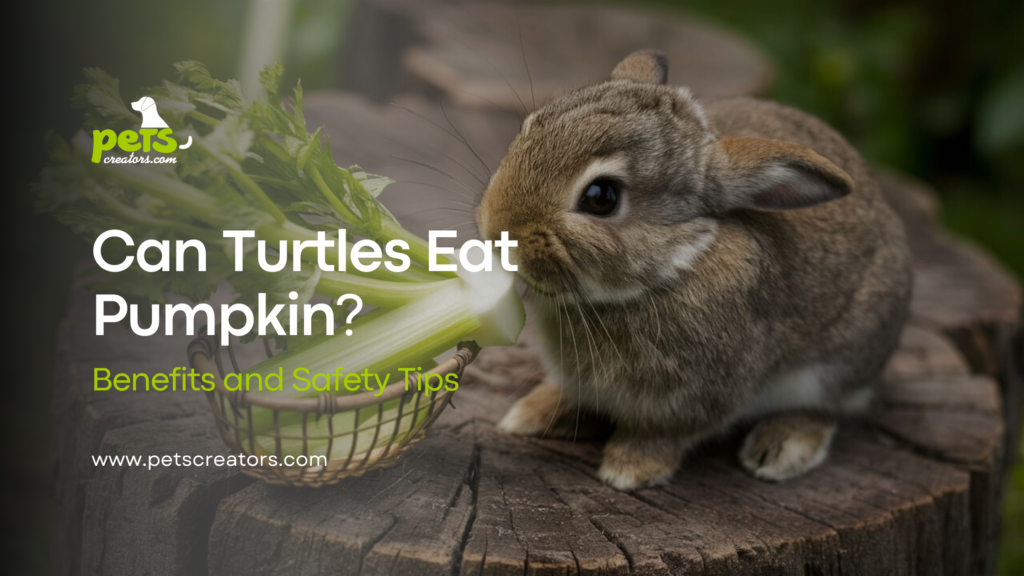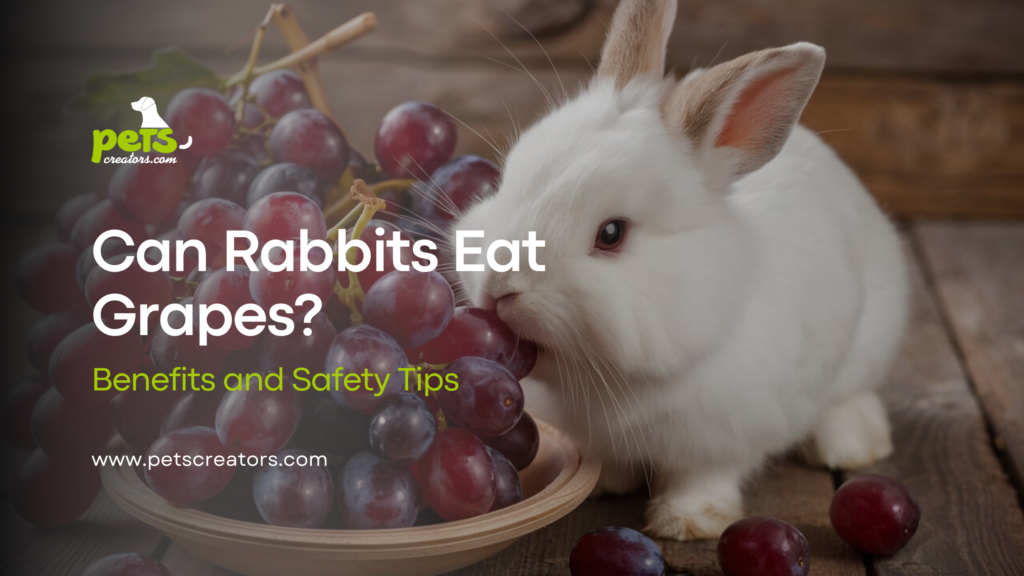While rabbits might enjoy taking grape stems, there are better options that you can give them when feeling stuck. Remnants of grapes may contain hard stems which may be chewy and thus the possibility the consumer can choke on the substance. It is, however, important to avoid giving rabbits spinach as the vegetable is hard for a rabbit to chew and is toxic to them. Other preferred options include vegetables such as carrots and bell peppers which are fresh. These alternatives are a lot easily consumed and come with diverse vitamins and minerals that can benefit a rabbit. Can Bunnies Eat Grape Stems?
Safe Alternative to Rabbit Eat Grape Stems?
There are better options that you can opt for case as feeding the rabbits with grape stems as you may have thought. Grape stems are very hard and possess many fine fibres which are dangerous to the health as they can easily cause choking. Rather, rabbits should include foods like romaine lettuce, kale or parsley, as these are soft leafy vegetables that are easier to digest for rabbits and very nutritious. Pasta can also be healthy when prepared from fresh vegetables such as carrots and bell peppers. These alternatives are easier on the digestion and come with different nutrients which are important for the rabbit’s body.
Risks of Feeding Eat Grape Stems?
Grape stems can pose several risks to rabbits. First, they can be difficult to chew and swallow, increasing the risk of choking. Additionally, the fibrous texture of grape stems might cause gastrointestinal blockages if ingested in large quantities. Grape stems may also contain pesticides or other chemicals, which can be harmful to rabbits. It’s essential to wash them thoroughly if you do decide to feed them to your rabbit. Another risk is that grape stems may not provide any significant nutritional benefit and could fill up the rabbit’s stomach, leaving less room for more nutritious foods.
Effects of Eat Grape Stems on Rabbit?
The effects of grape stems on rabbits can vary. Some rabbits might chew on them without any immediate issues, but others could experience digestive discomfort. Since grape stems are not easily digestible, they can lead to blockages in the digestive tract. This can cause symptoms like bloating, lethargy, and reduced appetite. If a rabbit consumes grape stems regularly, it might develop chronic digestive problems. Therefore, it’s crucial to monitor your rabbit closely if you decide to introduce grape stems into its diet, watching for any signs of distress or changes in behaviour.
Are Eat Grape Stems Good for Rabbit?
Rabbits can eat grape stems but it is not very healthy for them and should not be consumed often. Rabbits should not feed on grape stems as they do not have much nutritional value for the rabbits. Instead, concentrate on the provision of foods that have been said to be healthy for them as infants. Fresh vegetables, hay, timothy hay, and commercial rabbit food pellets should constitute the major meal of rabbits. These foods are rich in nutrients such as vitamins, minerals as well as fibre which are essential for the rabbit’s health. Receiving treats in the form of small fruits is acceptable but grape stems should not be part of its regular diet.
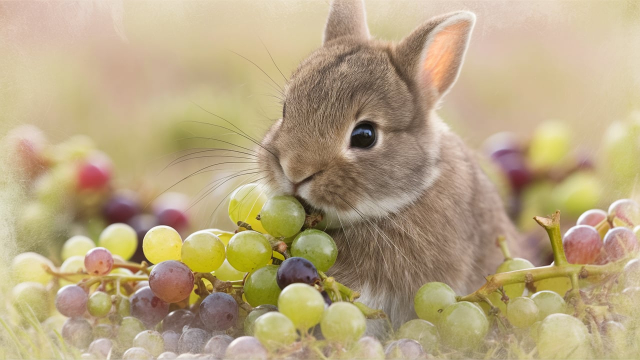
Nutritional Value of Eat Grape Stems for Rabbit?
Grape stems don’t offer much in terms of nutrition for rabbits. They are primarily composed of fibre and have very little in the way of vitamins and minerals. While fibre is important for a rabbit’s digestive health, grape stems are not the best source. Hay and leafy greens provide more balanced nutrition. If you’re looking for nutritious snacks for your rabbit, consider vegetables like carrots, bell peppers, and leafy greens. These options are more palatable and beneficial for your rabbit’s diet.
How is Eat Grape Stems made?
Grape stems are the parts of the grapevine that hold the grapes together. They are removed during the grape harvesting and winemaking process. For home use, they can be collected after washing grapes thoroughly. However, this doesn’t make them suitable for rabbit consumption. If you want to prepare safe treats for your rabbit, consider using fresh vegetables or fruits that are known to be safe for rabbits, like apple slices (without seeds) or small pieces of carrot.
What Types of Eat Grape Stems Are Safe for Rabbits?
If you decide to give grape stems to your rabbit, it’s crucial to ensure they are free from pesticides and chemicals. Only offer organic grape stems that have been washed thoroughly. However, it’s important to remember that even safe grape stems should only be given in moderation and as an occasional treat. The majority of your rabbit’s diet should consist of hay, leafy greens, and rabbit pellets to ensure they receive balanced nutrition.
Do Wild rabbits eat Grape Stems?
Wild rabbits are opportunistic feeders and tend to eat a variety of plants, but grape stems are not commonly found in their natural diet. Wild rabbits prefer tender greens, grasses, and various herbs. Their diet is driven by availability and nutritional needs, so they typically avoid tough, fibrous plant parts like grape stems. If you want to mimic a natural diet for your pet rabbit, focus on providing a variety of fresh greens and grasses, which are closer to what wild rabbits would eat.
Why is Eating Grape Stems Harmful to Rabbits?
Eating grape stems can be harmful to rabbits due to their tough, fibrous nature. They are difficult for rabbits to chew and digest, increasing the risk of choking and gastrointestinal blockages. Additionally, if grape stems are not organic, they might contain harmful pesticides or chemicals. Even if washed thoroughly, the risk remains. For these reasons, it’s better to avoid feeding grape stems to your rabbit and stick to safer, more nutritious options.
Store-bought Eat Grape Stems and Rabbit
Store-bought grape stems are likely to contain pesticide residues and other chemicals, which can be harmful to rabbits. Even if you wash them thoroughly, some chemicals can remain. Additionally, store-bought grape stems might be too fibrous and difficult for rabbits to chew and digest. If you want to provide your rabbit with treats, opt for organic, rabbit-safe vegetables and fruits. Always introduce any new food gradually and observe your rabbit for any adverse reactions.
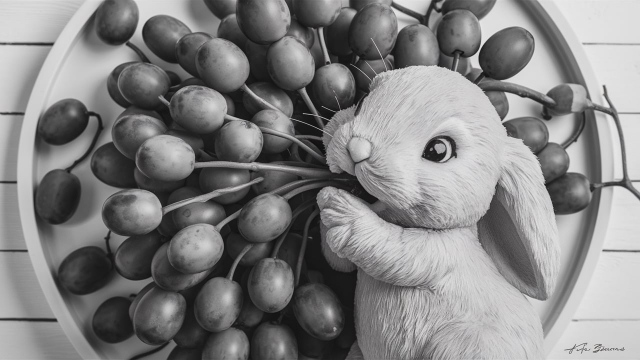
How Often Can My Rabbit Eat Grape Stems?
If you decide to feed grape stems to your rabbit, it should be done very sparingly. Think of grape stems as an occasional treat rather than a regular part of their diet. Given the potential risks, it’s better to limit their intake to small amounts once a week or less. Always observe your rabbit for any signs of digestive distress after feeding them grape stems and discontinue if any issues arise.
How Many Eat Grape Stems are there?
Grape stems can come in varying sizes and quantities depending on the type and number of grape bunches. However, when considering them for rabbit consumption, the quantity should be very minimal. Even a small bunch of grape stems can be too much for a rabbit. It’s best to offer just a tiny piece, if at all, to minimize any potential health risks.
Observing Your Rabbit After Eating Grape Stems?
After feeding your rabbit grape stems, closely monitor their behaviour and health. Look for signs of digestive discomfort such as bloating, lethargy, or changes in appetite. Pay attention to their droppings; changes in consistency or frequency can indicate digestive issues. If you notice any adverse reactions, remove grape stems from their diet immediately and consult a veterinarian if symptoms persist. It’s always better to err on the side of caution when introducing new foods to your rabbit.
What About Eat Grape Stems Seeds and Leaves?
Grape seeds and leaves are different from stems and have their own set of considerations. Grape seeds are small and hard, posing a choking hazard and potential for digestive blockages. Grape leaves might contain chemicals or pesticides and are generally not recommended for rabbits. Stick to feeding your rabbit foods that are known to be safe and nutritious, like fresh hay, leafy greens, and rabbit-specific pellets.
Tips for Serving Eat Grape Stems to Bunnies?
If you choose to serve grape stems to your rabbit, ensure they are organic and thoroughly washed to remove any chemicals. Offer only a very small piece as an occasional treat. Monitor your rabbit closely for any adverse reactions. It’s always best to introduce new foods gradually and observe your rabbit’s response. Remember that the bulk of their diet should consist of hay, fresh greens, and rabbit pellets for optimal health.
How does Eat Grape Stems digestion in rabbits?
Rabbits have a unique digestive system that is adapted to process high-fibre diets from hay and leafy greens. Grape stems, being tough and fibrous, can be difficult for rabbits to digest. If not chewed thoroughly, they can cause blockages in the digestive tract. This can lead to serious health issues, including discomfort, bloating, and potentially life-threatening conditions. Therefore, it’s crucial to be cautious with any food that is not a regular part of a rabbit’s diet.
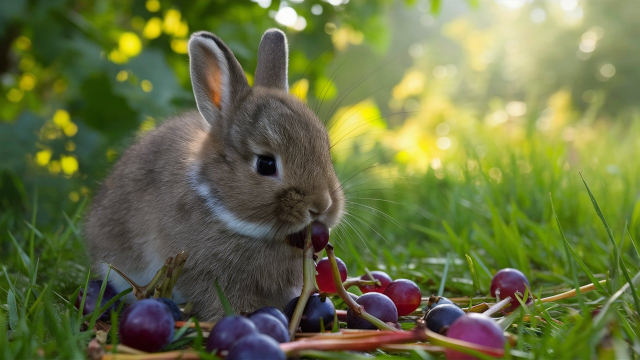
What are the nutritional benefits of eating Grape Stems for rabbits?
Grape stems offer minimal nutritional benefits to rabbits. They are primarily composed of fibre, but not the type that is easily digestible for rabbits. Hay and leafy greens provide a much better source of the necessary nutrients. While the occasional small piece of grape stem might not cause harm, it doesn’t contribute significantly to a rabbit’s nutritional needs. Focusing on foods that are known to be beneficial, like fresh vegetables and high-quality hay, is the best approach.
Do Rabbits Enjoy Grape Stems Food?
Rabbits might nibble on grape stems out of curiosity, but they don’t typically find them particularly enjoyable compared to other foods. Rabbits tend to prefer tender, leafy greens and fresh vegetables. These foods are not only more palatable but also provide better nutritional value. If you’re looking to treat your rabbit, offering small pieces of their favourite vegetables or fruits is a better option.
What parts of Grape Stems can rabbits eat?
If you decide to give grape stems to your rabbit, ensure they are organic and thoroughly washed. Only offer the smallest, tenderest parts of the stems. Avoid giving them any large, tough sections, as these are harder to chew and digest. Remember, it’s best to limit the quantity and frequency of grape stems in their diet to minimize any potential health risks.
Can rabbits Eat Grape Stem seeds?
It’s best to avoid feeding grape seeds to rabbits. Grape seeds are small and hard, posing a choking hazard and potential for digestive blockages. If your rabbit accidentally consumes a grape seed, monitor them closely for any signs of distress. However, it’s safer to prevent access to grape seeds altogether by removing them from any grapes you might offer as a treat.
Can Eat Grape Stems be toxic to rabbits?
Grape stems themselves are not inherently toxic, but they can cause digestive issues and other health problems if consumed in large quantities. The risk of pesticides and chemicals is also a concern. It’s essential to wash any grape stems thoroughly and offer them in very small amounts if you choose to feed them to your rabbit. However, focusing on safer, more nutritious treats is always the better choice.
Can Eat Grape Stems cause digestive problems in rabbits?
Yes, grape stems can cause digestive problems in rabbits. Their tough, fibrous nature makes them difficult to chew and digest. If a rabbit eats too many grape stems, it can lead to gastrointestinal blockages, which are serious and potentially life-threatening. Symptoms of digestive issues include bloating, lethargy, and changes in appetite. To avoid these risks, it’s best to offer more suitable foods that are easier for rabbits to digest.
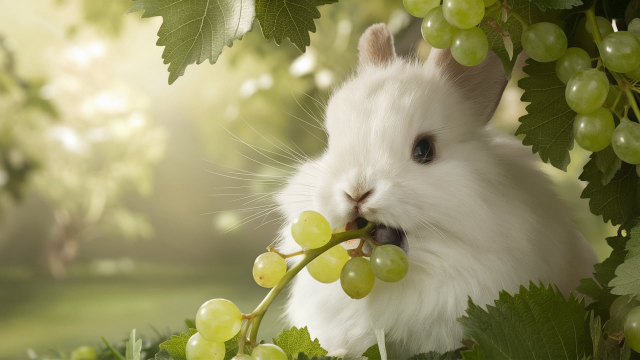
How do you introduce your bunny to Grape Stems?
If you decide to introduce grape stems to your rabbit’s diet, do so gradually. Start with a very small piece and monitor your rabbit for any adverse reactions. Make sure the grape stems are organic and thoroughly washed. Only offer grape stems occasionally and in tiny amounts. Pay close attention to your rabbit’s behaviour and health after consumption, and discontinue if any signs of digestive distress appear.
Preparing to Grape Stems for Rabbits?
To prepare grape stems for your rabbit, ensure they are organic and free from pesticides. Wash them thoroughly to remove any chemicals. Cut the stems into very small, manageable pieces. Offer a tiny piece as an occasional treat, monitoring your rabbit closely for any signs of discomfort or digestive issues. Always prioritize safer, more nutritious options for regular feeding.
How do rabbits eat Grape Stems?
Rabbits will typically nibble on grape stems out of curiosity. They might chew on them to explore the texture and taste. However, grape stems are tough and fibrous, which can make it difficult for rabbits to chew and digest properly. If you observe your rabbit struggling to chew or showing signs of discomfort, it’s best to remove the grape stems and provide more suitable foods.
What happens if rabbits eat too much Grape Stems?
If a rabbit eats too many grape stems, it can lead to serious digestive issues. The fibrous nature of grape stems can cause blockages in the digestive tract, leading to symptoms like bloating, lethargy, and loss of appetite. In severe cases, it can become a life-threatening situation requiring immediate veterinary care. To prevent this, limit the amount of grape stems you offer and monitor your rabbit’s health closely.
What If My Rabbit Eats a Large Amount of Grape Stems?
If your rabbit eats a large amount of grape stems, observe them closely for any signs of distress. Look for symptoms such as bloating, lethargy, and changes in appetite or droppings. If any of these symptoms appear, contact a veterinarian immediately. It’s important to act quickly, as gastrointestinal blockages can be life-threatening. Preventing access to grape stems in the future can help avoid this risk.
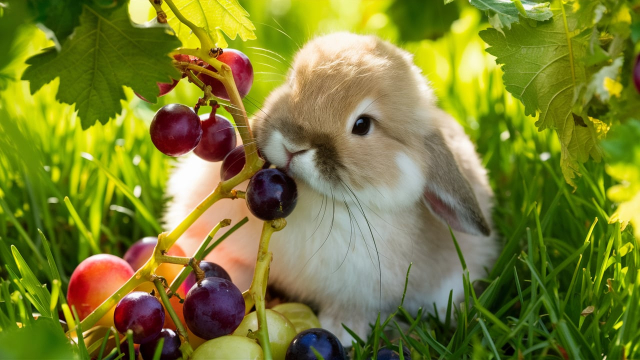
How Much Eat Grape Stems Can My Rabbit?
Your rabbit should only have a very small amount of grape stems if any at all. Think of grape stems as an occasional treat rather than a regular part of their diet. Even a small piece can be sufficient to satisfy their curiosity without posing significant risks. Always monitor your rabbit after introducing any new food to ensure they don’t experience any adverse reactions.
When shouldn’t you feed Eat Grape Stems to your Rabbit?
Avoid feeding grape stems to your rabbit if they have a history of digestive issues or if they are very young or old. Rabbits with sensitive digestive systems might be more prone to experiencing problems after consuming grape stems. It’s also best to avoid grape stems if they are not organic, as the risk of pesticide contamination is higher. Always prioritize safer, more nutritious options for your rabbit’s diet.
Can Baby Rabbits Eat Grape Stems?
It’s best not to feed grape stems to baby rabbits. Young rabbits have more sensitive digestive systems and are more prone to developing gastrointestinal issues. Their diet should consist primarily of their mother’s milk, transitioning to hay and leafy greens as they grow older. Introducing tough, fibrous foods like grape stems can pose unnecessary risks to their health.
How Frequently Should Adult and Baby Rabbits Be Fed Grape Stems?
Adult rabbits can have a very small piece of grape stem occasionally, but it should not be a regular part of their diet. Baby rabbits should not be fed grape stems at all due to their sensitive digestive systems. Focus on providing a balanced diet with hay, fresh greens, and rabbit pellets. Occasional treats can include small pieces of safe vegetables and fruits, but always in moderation.
Potential Dangers in Grape Stems?
The potential dangers in grape stems include choking hazards, digestive blockages, and pesticide contamination. Their tough, fibrous texture can be difficult for rabbits to chew and digest, leading to serious health issues. Pesticides and chemicals used in conventional farming can also pose a risk if the grape stems are not organic and thoroughly washed. It’s best to avoid these risks by offering safer, more nutritious alternatives.
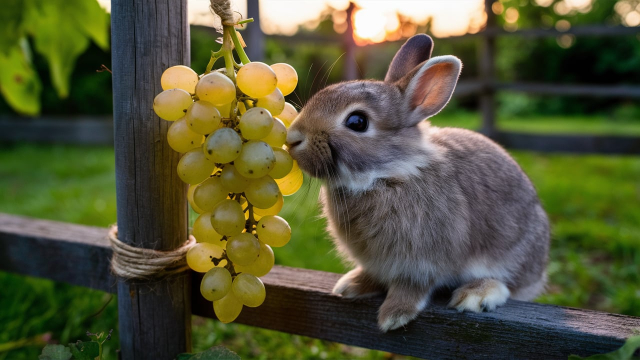
What if my Rabbit accidentally eats a lot of Eat Grape Stems?
If your rabbit accidentally eats a lot of grape stems, monitor them closely for any signs of distress. Symptoms like bloating, lethargy, and changes in appetite or droppings can indicate digestive issues. If you notice any of these symptoms, contact a veterinarian immediately. Acting quickly can help prevent more serious health problems. In the future, take steps to ensure your rabbit doesn’t have access to large amounts of grape stems.
Monitoring Your Rabbit’s Health with Grape Stems?
When feeding your rabbit grape stems, even in small amounts, it’s important to monitor their health closely. Watch for any signs of digestive discomfort or changes in behaviour. If your rabbit shows any symptoms of distress, remove grape stems from their diet immediately and consult a veterinarian if necessary. Regular monitoring and a balanced diet are key to maintaining your rabbit’s health.
Incorporating Fresh Greens and Vegetables
Incorporating fresh greens and vegetables into your rabbit’s diet is essential for their health. Foods like romaine lettuce, kale, and parsley provide important nutrients and are easier for rabbits to digest than grape stems. Fresh vegetables like carrots, bell peppers, and cucumbers can also be great additions. Always introduce new foods gradually and observe your rabbit for any adverse reactions to ensure their diet remains balanced and healthy.
What actions should I take if my Rabbit consumes Grape Stems?
If your rabbit consumes grape stems, monitor them closely for any signs of distress. Look for symptoms like bloating, lethargy, and changes in appetite or droppings. If any adverse reactions occur, contact a veterinarian immediately. It’s important to act quickly to prevent serious health issues. In the future, consider avoiding grape stems altogether and focus on providing safer, more nutritious treats.
Creating a Balanced Diet With Grape Stems
Creating a balanced diet for your rabbit doesn’t need to include grape stems. Focus on providing high-quality hay, fresh leafy greens, and rabbit-specific pellets. These foods offer the necessary nutrients for your rabbit’s health. Occasional treats can include small pieces of safe vegetables and fruits, but always in moderation. Ensuring a balanced diet with the right foods is key to keeping your rabbit healthy and happy.
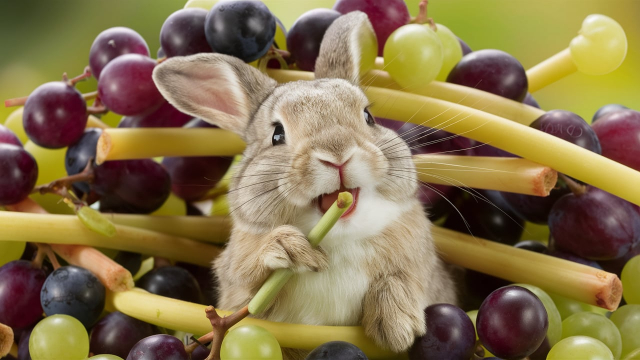
My Rabbit Eat a Whole Grape Stems?
If your rabbit eats a whole grape stem, monitor them closely for any signs of distress. Symptoms like bloating, lethargy, and changes in appetite or droppings can indicate digestive issues. If you notice any of these symptoms, contact a veterinarian immediately. Preventing access to grape stems in the future can help avoid similar incidents. Focus on providing safer, more nutritious foods for your rabbit’s diet.
Can Rabbits Eat Wild Grape Stems?
Wild grape stems might be more palatable than store-bought ones, but they still pose similar risks. They can be tough and fibrous, making them difficult to chew and digest. Wild grape stems might also be contaminated with environmental toxins or pesticides. It’s best to avoid feeding wild grape stems to your rabbit and stick to safer, more nutritious options like fresh greens and vegetables.
What Else Can I Feed My Rabbit Grape Stems?
Instead of grape stems, you can feed your rabbit a variety of safe and nutritious foods. Leafy greens such as romaine lettuce, kale, and parsley are excellent choices. Fresh vegetables like carrots, bell peppers, and cucumbers can also be added to their diet. Occasional treats can include small pieces of safe fruits like apples (without seeds) and berries. Always introduce new foods gradually and monitor your rabbit for any adverse reactions.
How to Create a Rabbit-Friendly Garden?
Creating a rabbit-friendly garden involves growing safe and nutritious plants that your rabbit can enjoy. Plant a variety of leafy greens like romaine lettuce, kale, and parsley. Herbs like basil and cilantro are also great options. Ensure your garden is free from pesticides and other chemicals. Providing a safe outdoor space with plenty of shade and fresh water can make it an enjoyable environment for your rabbit.
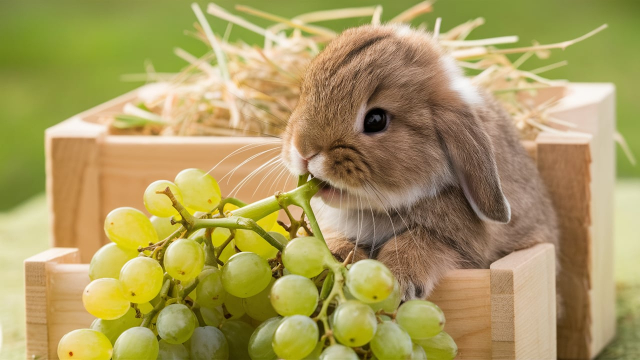 Grape Stems Feeding Guidelines and Amounts?
Grape Stems Feeding Guidelines and Amounts?
If you decide to feed grape stems to your rabbit, it should be done sparingly. Only offer a very small piece as an occasional treat. Ensure the grape stems are organic and thoroughly washed. Monitor your rabbit closely for any signs of digestive discomfort or changes in behaviour. It’s best to focus on safer, more nutritious foods for their regular diet.
Rabbit Treats Made at Home With Grape Stems?
Making homemade rabbit treats is a fun way to provide healthy snacks. However, grape stems should not be a primary ingredient. Instead, use safe vegetables and fruits like carrots, apples (without seeds), and leafy greens. You can create simple treats by blending these ingredients and forming small, bite-sized pieces. Always ensure the treats are suitable for your rabbit’s diet and introduce them gradually.
Conclusion
To sum up, grape stems may not be the most advisable for your rabbit, but knowing the dangers and lack of nutrients here is valuable. There are safe foods that are rich in nutrition, these include vegetables, and fresh and green leafages which do not pose any risk of causing death as evidenced by grape stems. It is also very important to always seek to keep your rabbit as healthy as possible by feeding him or her a well-balanced diet besides observing his or her reaction to new foods. If managed well, your rabbit will remain healthy with secure treats that can make him or her joyful.
FAQs
Can rabbits eat grape stems?
Yes, but only in very small amounts and occasionally. They are tough and can be hard to digest.
Are grape stems nutritious for rabbits?
Not particularly. They don’t offer significant nutritional value compared to other rabbit-safe foods.
What are the risks of feeding grape stems to rabbits?
Grape stems can cause choking, and digestive blockages and may contain harmful pesticides.
How often can I feed my rabbit grape stems?
Only occasionally, as an infrequent treat. Focus on more nutritious foods for regular feeding.
Can baby rabbits eat grape stems?
No, baby rabbits have more sensitive digestive systems and should not eat grape stems.
What should I do if my rabbit eats too many grape stems?
Monitor for signs of distress like bloating or lethargy and contact a vet if symptoms appear.
What are better alternatives to grape stems?
Leafy greens like romaine lettuce and kale, and fresh vegetables like carrots and bell peppers.
Do wild rabbits eat grape stems?
Wild rabbits prefer tender greens and grasses, and grape stems are not a common part of their diet.

